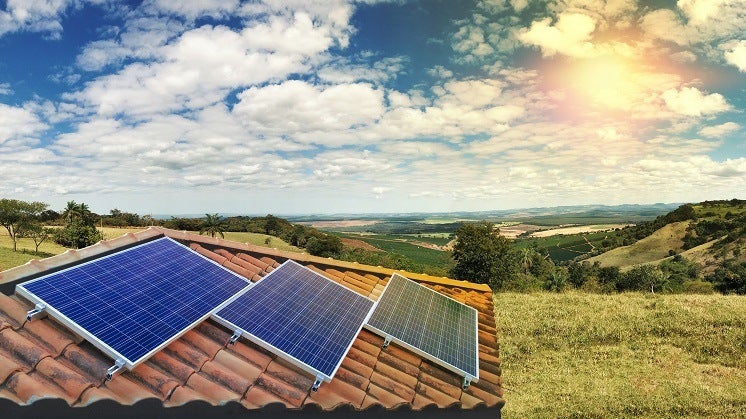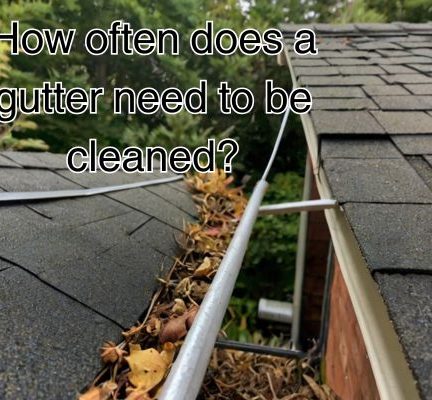
Despite having a well-earned reputation for rainy, cloudy, and grey weather, Scotland still has more than enough sunlight to make solar panels a fantastic investment.
In fact, research shows that the UK as a whole actually gets just as much solar energy as Spain, France, and other countries renowned for their warmer climate.
This surprising statistic is born from the fact that solar panels use light to produce electricity rather than heat and can even fall in productivity once they reach a certain temperature.
Although your panels will certainly produce more energy on a clear sunny day, they will still produce a certain amount in cloudy weather and windy conditions may even increase their efficiency, having a cooling effect on the PV modules.
What is the affect of extreme weather on solar panels?
The impact of climate change has been felt all across the world, and more and more extreme weather is hitting Scotland every single year.
Unfortunately, high amounts of wind, rain, and snow mean that solar panels must be sturdier than ever before, or they will degrade at a much faster rate.
Luckily, technology has also advanced at a rapid rate and modern solar panels are designed specifically to deal with less than ideal weather conditions.
You may be shocked to learn that solar panels will even work to some extent when it’s snowing, with the residual heat produced by your panels melting the snow as it falls, although heavy snow that manages to settle on your panels will certainly prevent it from working to its full potential.
To make it harder for snow to settle, there are certain treatments that can be applied to the surface of each panel, but this is something that is probably only worthwhile if you live somewhere that gets heavy snowfall on an annual basis.
Do clouds effect solar panel production?
Anyone who has gone out on a cloudy day and returned home sun burnt knows only too well that clouds do not fully block the sun’s rays.
Of course, clouds do block certain amounts of light, and solar panel effectiveness will be reduced when the cloud level is low, but not to the extent that many people believe.
The type of cloud that is present at the time is also important, as high clouds will reflect far less sunlight energy than low clouds.
Certain cloudy conditions can actually be great for solar panels.
For example, ice crystals contained within high-altitude clouds can act as a lens, making sunlight appear brighter than usual, and focussing the rays into a certain location.
This effect is unimaginatively named cloud lensing.
Are sunny days better for solar panels?
The more sunlight reaching your solar panels the more energy that will be produced, but this isn’t always for the best.
Producing too much solar energy, with nowhere to store or use it, has the potential to cause unexpected power surges that can either damage electrical devices or cause a blackout.
Modern solar panels are designed specifically to avoid such an incident but if you have recently moved into a new property with solar panels installed it is worth having them inspected as soon as possible.
To maximise how much clean, free energy you are able to produce on those seemingly rare sunny days, you might consider having a solar battery installed alongside your solar PV panels.
On clear days, the average home solar panel system will produce far more electricity than can be used in a domestic home, and being able to store this energy, for use at night or on a rainy day is hugely beneficial.
If you do not wish to install a battery, or your home is deemed unsuitable, you will be able to sell any excess back into the national grid thanks to the Smart Export Guarantee (SEG).
Do solar panels work when it is cold?
Yes, as solar panels rely on the light being emitted from the sun rather than its warmth, cold weather will not have any detrimental effect on your solar panel output.
In fact, cold but sunny weather is actually the optimal conditions for solar panel operation.
Like most electrical equipment, solar cells operate far more efficiently when temperatures are lower and excessive heat will only reduce productivity.
Without getting too technical, the greater the differential between the energy in photons from sunlight and electrons in the solar cells, the more energy will be produced, and cold weather maximises this difference.
What about snow?
Whilst cold weather is beneficial for pv panels scotland there are limits.
Heavy snow fall that is allowed to settle on your solar panels, for example, will significantly damage their operation.
However, as solar panels are tilted towards the sun, snow will not as easily cling to them as it would other surfaces.


